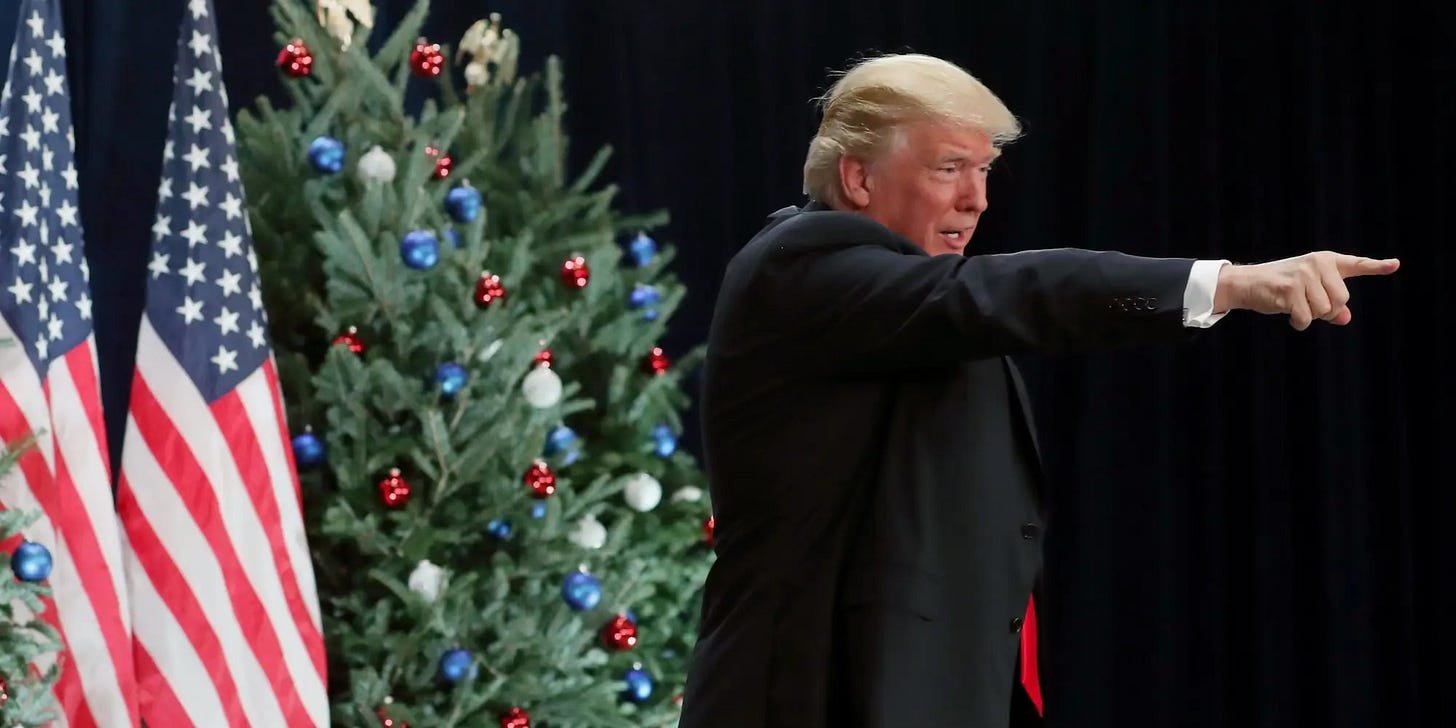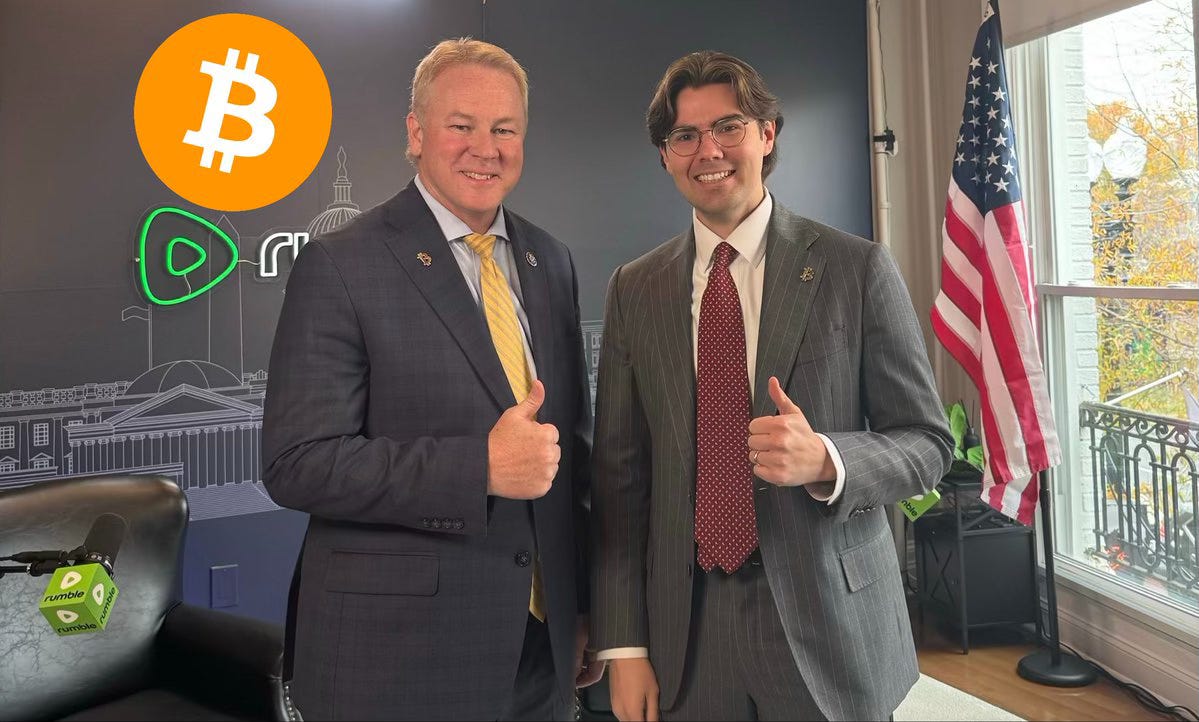Crypto's Christmas Wish to the White House: Act Now on Regulatory Clarity
Over 60 crypto firms and advocacy groups urged the White House to act on key policy priorities while legislation remains in progress
Welcome to the Friday edition of the Crypto In America newsletter!
What you’ll read: The crypto industry is asking the White House for clarity — now. Warren Davidson wants Americans to pay taxes in Bitcoin, plus the latest in the SEC’s case against Unicoin and this week’s top stories.
The crypto industry is growing impatient as market structure legislation is now expected to drag into next year.
More than 60 crypto firms and advocacy groups sent President Trump an early Christmas list this week, outlining over a dozen measures they want the administration to prioritize while Congress continues work on the bill.
Spearheaded by the Solana Policy Institute, the letter urges immediate action from the Treasury and IRS on policy initiatives largely included in the President’s Working Group Report on Digital Assets released in July.
Here’s a breakdown of the key asks:
Tax clarity: Guidance on staking, mining, airdrops, cross-chain transactions, collateral pledging, and charitable donations (to prevent taxes on income before it’s actually realized) and to align rules with economic reality.
Regulatory certainty: Clear rules for developers, DeFi protocols, and self-custody of digital assets, including no-action relief and safe harbors under existing frameworks.
DeFi protection and innovation: Updated FinCEN guidance, cybersecurity measures, and support for decentralized projects to thrive in the U.S.
Justice for Tornado Cash developer Roman Storm: Urging the DOJ to drop charges and affirm that publishing open source software is not a crime.
The missive, signed by a mix of names including Uniswap, Ledger, FalconX, and Paradigm, emphasizes that these steps could deliver ‘quick wins’ for the U.S. crypto industry, supporting Trump’s goal of making America ‘the crypto capital of the world’ while broader legislation remains in progress.
“The roadmap exists. Now agencies must act to cement American leadership in crypto,” SPI wrote on X.
SEC vs. Unicoin: What’s Happening Now
The SEC’s last remaining crypto case against Unicoin is still moving forward despite the company’s campaign to get it tossed.
After filing its motion to dismiss in August, the company, which markets itself as a token-backed real estate project, sent a letter last week to SEC Enforcement Director Margaret Ryan urging the agency to drop the case, saying the SEC is misinterpreting its real estate deals and cherry-picking marketing language to make ordinary projections look like fraud.
“They are twisting the facts,” Unicoin co-founder and Chief Strategy Officer Silvina Moschini told Crypto In America.
Moschini, who was also named in the SEC’s complaint alongside co-founder Alex Konanykhin, says all property deals were backed by binding agreements and valued in Unicoin tokens swapped for land. She adds that promotional language was always paired with clear risk disclosures and points to voluntary SEC filings, audited financials and limiting sales to accredited investors as evidence of compliance efforts.
The SEC still claims Unicoin and its executives overstated property acquisitions, misstated financials, and improperly sold ‘Unicoin Rights Certificates,’ which are contracts giving investors the right to receive future Unicoin tokens once the company’s token sale occurs.
“They say we didn’t have the assets we disclosed, when those assets were in binding contracts and escrow and would have appeared on the balance sheet at the ICO,” Moschini said. “But they froze the ICO and then accused us of not having what they prevented us from finalizing.”
An SEC spokesperson declined to comment beyond the agency’s public filings.
Why this matters: The SEC under Chairman Paul Atkins has stepped back from nearly all Gensler-era crypto cases since Trump took office, but Unicoin is the exception, with the agency bringing the case in May. While the company leans on the narrative that it’s a leftover from the Gensler days, regulators are still treating it as a traditional securities fraud case rather than the ‘come in and register’ type that defined many Gensler-era lawsuits.
Konanykhin says the SEC has until December 9 to reply to the company’s motion to dismiss.
Pay Taxes in Bitcoin? A New Bill Would Make It Possible
Rep. Warren Davidson (R‑OH) introduced the Bitcoin for America Act this week, allowing Americans to pay federal taxes in Bitcoin while funding the U.S. Strategic Bitcoin Reserve established by a March executive order.
The idea, according to Davidson, is to create a non-inflationary, appreciating store of value that strengthens U.S. finances, keeps the country competitive globally, and funds the Strategic Bitcoin Reserve in a budget-neutral way.
Under the bill, Bitcoin payments would satisfy tax liabilities with no capital gains, and the coins would be held under strict custody for at least twenty years. Davidson says the plan is opt-in and could expand financial access and choice for unbanked Americans.
“What’s really cool is that this is a democratic way to go about the Bitcoin reserve. If people want to build the reserve and support this policy, the bill lets each individual choose at the end of the year. If you don’t, that’s fine, but it still democratizes an important policy decision, which is rare in legislation,” Conner Brown, Head of Strategy at Bitcoin Policy Institute, told Crypto In America.
Brown, who joined BPI last month after serving as a staffer for pro-crypto Wyoming Senator Cynthia Lummis, said the bill will likely go to House Ways and Means and Financial Services, committees currently weighing how to modernize crypto tax rules.
He also noted that early feedback in Congress has been positive, with lawmakers canvassed by BPI broadly supportive of securely holding government-held Bitcoin, even though the idea of actively buying the asset on the open market remains largely controversial.
Invest as you spend with the Gemini Credit Card®. Get approved to earn $200 in Bitcoin. Issued by WebBank. Terms apply.
Weekly Recap

ICYMI. Here are the biggest news stories this week from the intersection of Washington and Web3:
The Senate Agriculture Committee advanced CFTC Chair nominee Mike Selig in a 12–11 vote, with no Democrats voting in favor. His nomination now heads to the full Senate for a vote.
The Senate Banking Committee advanced FDIC Chair nominee Travis Hill in a 13–11 party-line vote. His nomination now heads to the full Senate for a vote.
Crypto lawyer Khurram Dara launched a campaign for New York Attorney General, teeing up a possible showdown with incumbent Letitia James.
New Hampshire approved the first-ever Bitcoin-backed municipal bond, a $100 million conduit bond issued by the state’s business financing agency, which will allow buyers to borrow against over-collateralized Bitcoin held by a private custodian.
Rep. Warren Davidson (R‑OH) introduced the ‘Bitcoin for America Act,’ a bill that would allow Americans to pay federal taxes in Bitcoin.
Over 60 crypto firms called on the White House to act on tax guidance, DeFi protections, and dismiss the DOJ’s case against Tornado Cash founder Roman Storm in the absence of legislation.
Crypto advocacy group The Digital Chamber launched a new program called ‘State Network’ designed to educate lawmakers and help states shape crypto regulations ahead of the 2026 midterms.
Kraken announced it confidentially filed a draft S-1 with the SEC for a potential IPO following an $800M funding round that valued the company at $20 billion.
The OCC issued guidance that banks can hold crypto on their balance sheets to pay network, or “gas” fees and conduct transactions on public blockchains.
The Federal Reserve rolled out new supervisory principles to sharpen bank oversight and focus examiners on the most material risks.
The delayed September jobs report showed stronger-than-expected growth of 119,000 jobs, with the unemployment rate rising to 4.4%, its highest level in four years.
Fidelity, 21Shares, VanEck, and Canary Funds launched Solana spot ETFs, while Bitwise debuted an XRP spot ETF.
The White House is reviewing a Treasury proposal to let the IRS track and tax Americans’ foreign crypto holdings.
William Hill, co-founder of Bitcoin mixer Samourai Wallet, was sentenced to four years in prison for running an unlicensed money-transmitting business. His co-founder, Keonne Rodriguez, received a five-year sentence earlier this month.
The price of Bitcoin fell below $82,000, hitting its lowest level since April, amid a continued broader crypto and stock market selloff.
Remember, new editions of the Crypto In America newsletter drop every Monday, Wednesday and Friday at 7AM EST.
If you like what you’re reading, don’t forget to subscribe!








Voice from the past talking about the present, trying to inspire a better future. https://open.substack.com/pub/growingupaspen/p/technology-that-protects-people-not?r=2g93c&utm_medium=ios